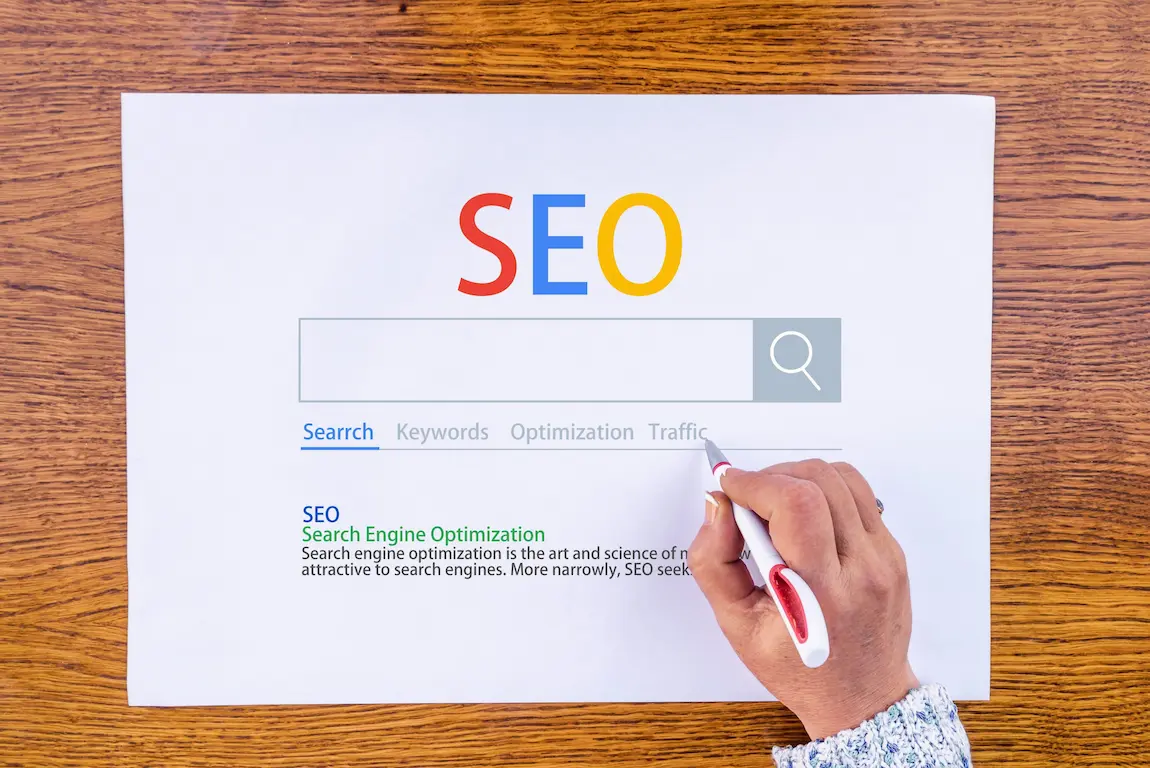Learn how SEO can boost your business’s online visibility, drive organic traffic, and improve your bottom line in this SEO guide.
Key Takeaways
- SEO is not just about using keywords to get ranked.
- The key to search engine optimization success is high-quality, useful content and a well-structured website.
- SEO takes time. But it is cost-effective in the long run.
- Consistency and technical soundness are essential for the results to be long-lasting.
What is SEO?
SEO (Search Engine Optimization) is a digital marketing practice aimed at improving website visibility and ranking in search engine results pages (SERPs). The primary goal of SEO is to drive organic traffic to a website by ensuring that it appears in the top positions for relevant search queries. This involves optimizing various aspects of a website, including content, structure, and technical elements, to match search engine algorithms like Google and Bing.
Improving how people find your website on search engines is called SEO. SEO stands for Search Engine Optimization. You’ve probably heard that it’s all about keywords. But SEO is so much more than that these days.
At the heart of all SEO efforts is delivering a high-quality, user-friendly experience. Ultimately, driving traffic and sales is the primary goal of SEO, as it is with all marketing efforts.
Think of your website as a digital shop window for your business. You’ll lose business if people can’t find it or navigate it easily. Optimizing for search is about making your website or work accessible and trustworthy and delivering results that lead to inquiries and sales. The principles of SEO are very similar to those of running a successful business.
How SEO Works
It’s important to understand the mechanics behind search engines to understand how SEO works. Search engines index content from across the web using crawlers (also known as spiders or bots).
These crawlers follow links from one page to another. They collect information that populates the search engine’s database. The search engine uses its indexing and ranking algorithms to retrieve relevant results when a user performs a search.
Why is SEO important?
Search engine optimization (SEO) is crucial because it helps businesses increase their online visibility, attract qualified traffic, and ultimately convert visitors into customers. With billions of searches conducted every day—over 8.5 billion on Google alone—effective SEO strategies can significantly increase a company’s reach and engagement with potential customers.
Search engine optimization helps to ensure that your business can be found online by the right people. When your website ranks high on search engines, you attract more potential customers. This can lead to more inquiries and sales.
And just like in business, being trusted matters. Being visible in search results shows that you are credible and trustworthy. This helps build trust with visitors.
SEO is also cost-effective in comparison to other marketing strategies, but it’s a long-term approach. The real value is in the steady flow of organic traffic, which over time leads to an increase in inquiries and sales. Sites with high rankings have been doing the right things for a while, and that trust translates into more business.
Evolution of SEO

Since its inception in the mid-1990s, the field of SEO has evolved considerably. Initially characterized by simple keyword-stuffing techniques, it has evolved into a sophisticated discipline. It requires an understanding of complex algorithms and user behaviour patterns. The focus has shifted to quality content creation and ethical link-building practices with major algorithm updates from Google, such as Panda and Penguin.
In recent years, advances in technology—including artificial intelligence (AI) and machine learning—have had an even greater impact on the way SEO strategies are developed and implemented. As these technologies continue to evolve, the practices associated with effective SEO will continue to evolve as well.
In summary, SEO is an essential component of digital marketing that enables websites to achieve higher visibility in search results through the use of various optimization techniques that focus on both the user experience and compliance with search engine guidelines.
The basics of SEO
SEO is about matching your website with what potential customers want. It helps create a smooth experience that turns visitors into leads or sales. A well-optimized website is like a well-run business: smooth, efficient, and built to drive inquiries and growth.
Key components of SEO
Content
SEO is based on having good content. Core pages, like your ‘About’ page and service pages, should be informative. They need to have original content.
This content helps potential customers understand what you offer. Well-written articles, such as how-to articles and feature articles, are also essential. Good content attracts visitors directly to your site and encourages inquiries and subscriptions.
Keywords
Keywords are still relevant. But they’re only one piece of the puzzle. It’s not enough just to use them.
Your content must answer your visitors’ questions. It must lead them to an inquiry or a sale. Understanding what your customers want is key, just as it is in business.
Website usability
It is vital to have a well-structured website that is easy to navigate. It helps users stay longer on the site. This makes it more likely they will ask questions or make a purchase.
Easy navigation between pages is key. A well-thought-out site structure and a seamless user journey can be as important to converting as the content itself.
How to get SEO right
Improve user experience
A seamless user experience is essential to keep visitors engaged. If your site is easy to navigate, visitors will explore more. This increases the chances that they will inquire. Every step on your website should lead to a lead or sale, just like a sales funnel in your business.
Ensure your website is technically sound.
Technical issues can disrupt the user experience and hurt your SEO efforts. If your site loads slowly or has broken links, visitors may leave before they find out more. Just like in business, having a solid foundation—your processes and systems—is key to success. Addressing these issues will help create a smooth path from visitor to inquiry.
Be consistent.
SEO requires ongoing effort. You wouldn’t stop marketing your business after one campaign, and search engine optimisation is no different. Update your website often with new content.
Check for technical issues regularly, as they can appear at any time. Adjust your strategy when needed. A consistent approach will keep your inquiries and sales growing.
Make your website work on mobile devices.
With the majority of users browsing on their mobile phones, your website needs to be mobile-friendly. If visitors can’t easily access your site on mobile devices, they’ll leave, and you’ll lose potential leads. Ensuring a smooth mobile experience increases the chances of users staying and exploring.
SEO Guide for Business Leaders
SEO is a vital tool for growing your business and increasing sales, but like all good marketing strategies, it takes time. The goal of SEO should always be to increase traffic and sales, so keep these metrics in mind. To grow your site, focus on three things.
- Improve user experience.
- Offer quality content.
- Keep your site running smoothly.
These steps will help you build a strong foundation for growth.
While we’ve covered the basics here, SEO is a broad and evolving field. There is more to think about. You can use tools like Google Search Console, Semrush, and Ahrefs to track your progress.
You should also explore local SEO, backlinks, and international SEO. The goal remains the same: more visibility, more leads, and more sales.
Search Engine Optimization FAQs

Can I do SEO myself?
While it’s possible to learn SEO, it’s a time-consuming process, and professionals can often get better results faster. Like any business, you might want to focus on what you do best—running your business. Let the experts manage the technical details to help you get more leads and sales.
What should I look out for when choosing an SEO agency?
Be wary of agencies that guarantee top rankings—they can’t. And avoid agencies that focus solely on keywords. Today’s SEO focuses on giving users a great experience. This leads to more inquiries and sales, which is what matters.
Do I need SEO even if I don’t care about ranking in search engines?
Yes, because search engine optimisation is more than just ranking for keywords. You also want to make sure that people find you when they search for your company name.
This is known as branded SEO. It is important if you want more inquiries. Half of people search for company names on Google instead of typing the URL directly.
Is SEO expensive?
SEO can be an investment, but consider the potential revenue you’re missing out on by not optimizing your site. No matter if you pick a budget or premium option, the goal is to boost inquiries and sales. This makes it a useful tool for long-term business growth.
Can SEO be done on any website?
Search engine optimisation can work on many websites. However, if your site has major issues, it’s often best to start fresh. Creating a website from scratch with good search engine optimisation practices will increase your chances of getting inquiries and sales.
How do I measure the success of SEO? What metrics should I be tracking?
The most important metrics are those related to inquiries and sales. Keep track of how many visitors become leads. Monitor the bounce rate, which shows how quickly people leave your site.
Also, check how often visitors take desired actions, like filling out a contact form or subscribing to your database. Tools such as Google Analytics can help you monitor these key metrics. Search Engine Optimisation success takes time, but the rewards are worth it.










18 Responses